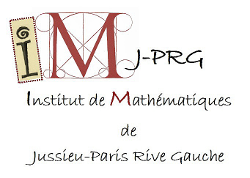| Résume | Starting from an arbitrary field K, one may form the rational function field K(T): the field of fractions of polynomials in one variable over K. K(T) naturally carries infinitely many K-trivial discrete valuations. One example of such a valuation is the so-called `degree valuation', whose valuation ring consists of those rational functions f/g given by polynomials f and g satisfying deg(f) ≤ deg(g). Is this valuation (first-order, or existentially) definable in the language of rings?
In 1978 Denef showed that, if K is the field of rational or real numbers, then the valuation ring of the degree valuation has an existential first-order definition in K(T) in the language of rings. His proof crucially relied on the ordered structure on the base field. In the decades thereafter, a myriad of different types of base fields K have been considered for which existential definability of the degree valuation in K(T) could be proven. Perhaps somewhat curiously, the used constructions and techniques all depend heavily on arithmetic properties of the base field K. To this day, no unified theory explaining all known examples seems to have been formulated.
In this talk, I will give an introduction to some of the algebraic and arithmetic ideas used to establish (existential) first-order definability of (non-henselian) valuations. I will in particular give an own interpretation of some ideas of Julia Robinson to study number fields, and of Jan Denef to study function fields. Insofar time allows, I will discuss results of joint research with Karim Johannes Becher and Philip Dittmann on how Denef's method can be generalized to cover other base fields. |

